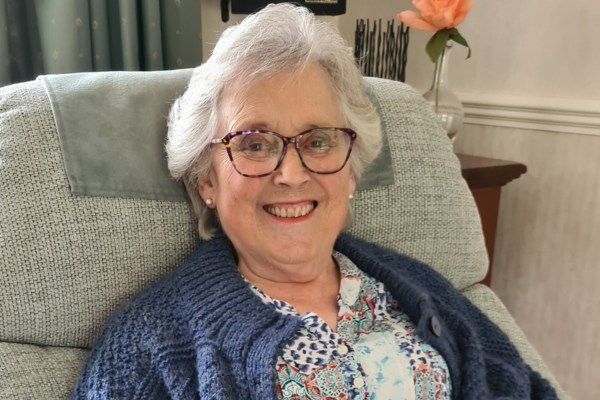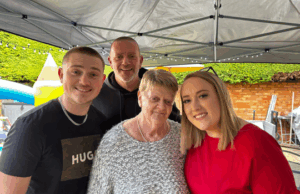

Jen Stirling told us recently about the impact of Florence Nightingale Hospice Charity at home service on her mother Maggie’s end-of-life care. This is a service that many people don’t even know about, but means that a patient with a life-limiting condition can be cared for at home, and die at home, surrounded by loved ones.
“The nurses dealt beautifully with any problems” said Jen, “Mum trusted them and felt she was in safe hands.”
Maggie was diagnosed with stage 4 endometrial cancer in September 2021, just as Jen was finalising her own move away from Buckinghamshire to Wales. “Trust me to be a drama queen!” she told Jen, who commented that her Mum was anything but. She was a committed Christian and accepted her lot, however she wanted to receive medical treatment so that she could live a little longer. She had chemotherapy and was able to attend her granddaughter’s wedding in the summer of 2022. However the chemo was damaging to her heart and early in 2023 she decided to stop, as all the hospital treatment had taken its toll.
Jen considers that she was very lucky as she was with her mum when the first visit from Florence Nightingale Hospice Charity’s at home team was made to Maggie in Haddenham, Buckinghamshire. Jen said that lead nurse Liz asked bold and direct questions to Maggie, putting Maggie in charge of the decision making about where she wanted to receive her treatment: “What do you want Maggie?” Maggie replied that she’d really like to stay at home, but wasn’t sure she would be able to. It turned out that with ongoing support from Jen and Maggie’s husband, as well as the Florence Nightingale Hospice nurses, Maggie would be able to stay at home as she had wanted.
The Hospice provided the equipment that Maggie needed. This included a slide sheet to help manoeuvre her, a commode, catheter equipment and most importantly a hospital bed. With the flick of a switch, Maggie could be raised or lowered meaning that the personal care that the nurses provided was much easier and that she was comfortable.
Jen stayed with Maggie for her last days, and all the family was able to spend time with her, and with each other. The Florence Nightingale Hospice nurses visited Maggie twice a day to wash her, make her comfortable and stock and check her pain medication. They advised Jen and her Dad how to keep Maggie comfortable between their visits, and help her to take Oramorph as necessary. Jen said the nurses took time to answer any questions and offered plenty of support in distressing moments. She said “They reassured me when mum’s breathing was noisy that it wasn’t causing her any additional pain.”
“The nurses were fabulous,” Jen continued, “they always spoke into her ear and said ‘Hello Maggie’, getting a weak ‘Hello’ back only shortly before Maggie died. “They were all lovely in different ways” Jen said. “They were very gentle, very Maggie centred, they knew which moisturiser she liked and similar. They remembered things that mattered.”
Maggie died in the early hours of 1st July 2023. She had chosen two pieces of music for her funeral and Jen was also able to play one of these ‘Be still for the presence of the Lord’ during Maggie’s final days.
“Everyone managed to say goodbye to her,” Jen continued and she is very grateful to the Florence Nightingale Hospice nurses for the sense of normality that Maggie was able to experience by staying at home, in her own bed, snoozing or being with her family.
Jen’s main wish from this experience is that families become more used to talking about death, for example deciding where they want to die and if they have any special wishes for their funeral. She also wants people to become more aware of the at home service provided by the Hospice. This can be made to work if there are family members living with the patient who are also able to care in conjunction with the nurses. “Having a good death is important,” says Jen, “and I think Mum had a good death.”



The Hospice
The Charity
Fundraising
The Hospice
The Charity
Fundraising